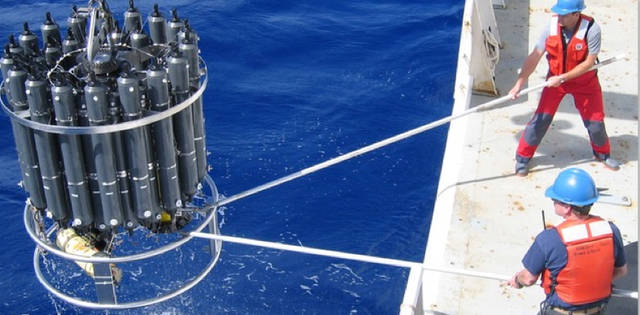LIHUE — The ocean is bearing the brunt of increased carbon dioxide (CO2), swallowing it up and helping to keep emissions out of the atmosphere.
And, scientists say, while eventually it will become saturated, that point hasn’t been reached — though absorbing CO2 is causing an increase in acidification.
The new research is outlined in the latest issue of Science journal, published by an international team of scientists that include University of Hawaii at Manoa oceanography professor Christopher Sabine.
The team found the ocean is absorbing CO2 from fossil fuel combustion at an increasing rate from the 1990s to the early 2000s.
The report says the ocean takes up as much as 34 gigatonnes (billions of metric tonnes) of human produced carbon between 1994 and 2007.
“The uptake and storage in the ocean of human produced CO2 has significantly decreased the climate change effects the planet has seen so far,” said Sabine in a press release. Getting a handle on how much more the ocean can take is critical for predicting future climate change impacts.”
It’s a two-step process — first the CO2 dissolves in the surface water and, second, currents fold the CO2 deeper underwater in a process scientists call “sink.”
Without this sink, the concentration of CO2 in the atmosphere and the extent of anthropogenic climate change would be considerably higher, according to UH researchers.
Scientists from seven countries started doing research cruises in 2003, gathering information on ocean chemistry. They found as the atmospheric concentration of CO2 rises, oceanic sink strengthens more or less proportionally. The more CO2 is in the atmosphere, the more is absorbed by the oceans – until it eventually becomes saturated, researchers say.
So far, though, that point hasn’t been reached.
“Over the examined period, the global ocean continued to take up anthropogenic CO2 at a rate that is congruent with the increase of atmospheric CO2,” said Nicolas Gruber, professor of environmental physics at ETH Zurich and lead author of the study.
Sabine points out it’s reassuring the “marine carbon sink” is still intact, but said “it comes at a price.”
That’s because CO2 dissolved in the ocean makes seawater more acidic. That can impact marine organisms like coral. Coral’s skeletons and things like calcium carbonate shells can dissolve in ocean water that’s too acidic. The changing chemical composition of the ocean can also impact physiological processes such as the breathing of fish.
“Documenting the accumulation of human produced CO2 in the ocean and the resulting acidification is particularly important for Hawaii, where our tourism and fishing industries depend on healthy ecosystems,” Sabine said in the release. “A clear understanding of the stress we are putting on our marine ecosystems from burning fossil fuels will help us to better manage our resources sustainably.”
•••
Jessica Else, environment reporter, can be reached at 245-0452 or jelse@thegardenisland.com.


